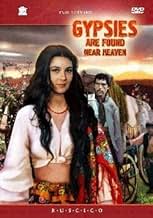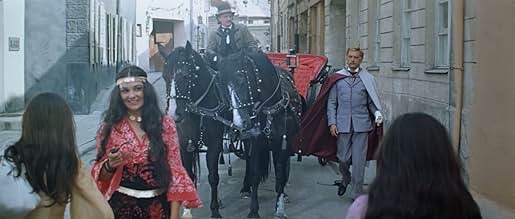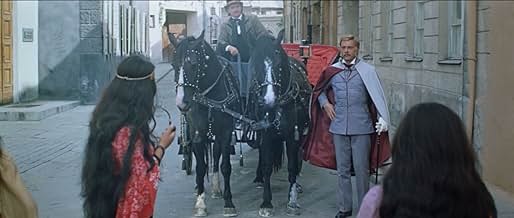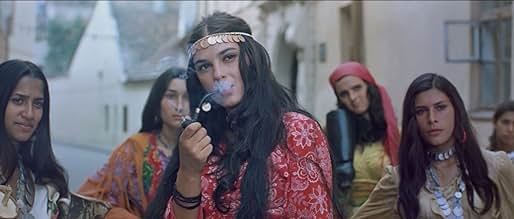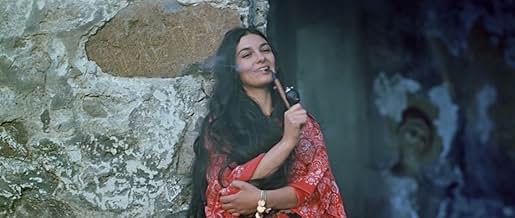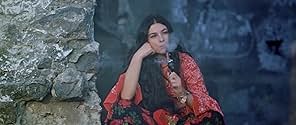IMDb RATING
7.3/10
2K
YOUR RATING
Rada, a beautiful and very proud gipsy girl is used to steal men's hearts and monk them. Zobar is a horse thief who's heart is stolen by Rada and his mind is bewitched. He is ready to give u... Read allRada, a beautiful and very proud gipsy girl is used to steal men's hearts and monk them. Zobar is a horse thief who's heart is stolen by Rada and his mind is bewitched. He is ready to give up his freedom but not his pride.Rada, a beautiful and very proud gipsy girl is used to steal men's hearts and monk them. Zobar is a horse thief who's heart is stolen by Rada and his mind is bewitched. He is ready to give up his freedom but not his pride.
- Awards
- 1 win & 1 nomination total
Grigore Grigoriu
- Loiko Zobar
- (as Grigori Grigoriu)
Barasbi Mulayev
- Makar Chudra
- (as B. Mulayev)
Boryslav Brondukov
- Bucha
- (as Borislav Brondukov)
Vasyl Symchych
- Balint
- (as Vasili Simchich)
- Director
- Writers
- All cast & crew
- Production, box office & more at IMDbPro
Featured reviews
A movie that could only have been made in the 70s. Very free and very lyrical. Poetic but still very earnest with a touch of nudity. While nudity nowadays is not a big deal, I suppose it was back then (even through all the Flower Power movement). And therefor it got special mention before the screening (this year, 2010).
This shouldn't be the reason for you to watch the movie though. There is other movies out there ready to be explored, if you are looking for that kind of thing. This movie on the other hand, just lives the free spirit and does not take a particular road. Or tells a great story for that matter. It's all about humans and gypsies in general (though that might not be the political correct term to call them). And a promise the movie makes, that is kept in the end ... not that you did not see that coming ... just saying
This shouldn't be the reason for you to watch the movie though. There is other movies out there ready to be explored, if you are looking for that kind of thing. This movie on the other hand, just lives the free spirit and does not take a particular road. Or tells a great story for that matter. It's all about humans and gypsies in general (though that might not be the political correct term to call them). And a promise the movie makes, that is kept in the end ... not that you did not see that coming ... just saying
I was a kid (in 6th grade) when I saw this movie , Of course I liked this movie for different reasons : I was attracted at that time by the music , by the intensity of scenes ....etc. Now as a mature person I can add more to that picture : the costumes are beautiful , the image is beautiful , sunny , colorful , and after all who can forget the mesmerizing eyes of Rada especially in two scenes : when she stopped with a single look the unchained horses of the baron and second scene with Luicu Zoibar. Now a lot of time elapsed since the movie was released , the director Emil Loteanu and actor Grigore Grigoriu are not with us , but this gem is actual and brand new , it never got old . I agree that is better than Gatliff or Kusturica as a gypsy movie , nobody was more authentic in depicting gypsy life as Loteanu , costumes are authentic , besides main characters the rest of SATRA are real ethnic Gypsies , not look- alike , songs are sung in Romany not Russian or whatever , and they were sung in a lot of weddings or parties in Romania , everybody knew them (even people who never watched the movie).As I said Gypsies are depicted as they are : with qualities , with defects , no stereotypes , unbiased. They are not the Gypsies of SNATCH , where Brad Pitt looks anything you like : Chinese,Arab,east-European.....whatever but never like a gypsy. Who wants to know more about Roma nation they should watch this movie . It is a sad and impossible love but I do not say more I let the viewer to judge this movie . Myself I was impressed and I had a wonderful experience re-watching this movie , you award this with an Oscar and still is not enough... It is a must see !
beautiful songs, beautiful story. inspired performances. wise manner to present/remember old traditions and a page of gypsy's past who could be seeds for the present problems. sweet, romantic, remembering pages from Russian classic literature, it is a beautiful film, mixture of magic, love, faith and rules who seduce and impress, first form of Bregovic's universe and soap opera. it reflects the circle 's pieces of a community and have a cut couple as lead characters. and not the story remains after its end in memory but the music. old songs, fascinating dances, strange forms of courage, freedom in different definition, the dangerous games, the high price of honor, the love in its large forms. a film who could have many sides. because it is an ethnographic trip, a dark fairy tale, a romantic story, a film with a generous message, an aesthetic delight.
Moldovan director Emil Loteanu's tenth feature film is probably his most famous one. "Gypsies Are Found Near Heaven" (1976) was a huge hit in the USSR, the most watched film in cinemas that year and also something that the critics fancied. The film, based on two stories by Maxim Gorki, is a depiction of wandering Gypsies in the turn-of-the-century Austria-Hungary. These people travel from one place to the next without staying long. They dance, they sing, and they fall in love.
Loteanu's film is very colorful and kind of other-worldly in its depiction of history. Though it is supposed to be taking place in 1900 or something, the gypsies at times look like 1970's hippies, and the look of the film is a tad anachronistic. It is not a narrative-driven film, but instead focuses on the atmosphere. There is a lot of gypsy music in it, which was historically interesting, and many of the songs were a joy to listen to. As a depiction of a disappearing way of life, this film works well. As a well-thought-out artistic experience, it's pretty messy. Some will like it more than others.
Loteanu's film is very colorful and kind of other-worldly in its depiction of history. Though it is supposed to be taking place in 1900 or something, the gypsies at times look like 1970's hippies, and the look of the film is a tad anachronistic. It is not a narrative-driven film, but instead focuses on the atmosphere. There is a lot of gypsy music in it, which was historically interesting, and many of the songs were a joy to listen to. As a depiction of a disappearing way of life, this film works well. As a well-thought-out artistic experience, it's pretty messy. Some will like it more than others.
A poem about freedom and love. A strange world of joy, ambitions and desires. A form of escape and a colorful dream.
Emil Loteanu was a special director for the way chosen. His movies, products of Sovietic cinema, are, very often, touching skits of a raw cardboard's space. The stake- to prove the identity of a small nation in a empire. The means- Russian art of purlieus. Accent on the dramatic themes and emotions like only message.
"Tabor ukhodit v nebo" is only a picturesque film about a imaginary community. His importance is not small because the Gipsys are the product, in the self-image ,of this movie, slice of a possible golden age at the beginning of XXth century. In same time, it is a good introduction to Kusturica filmography, with the aspects of a ambiguous Balkan's life, with songs and carousals with barbarian persistent taste, with full of color atmosphere and any way of business.
So, a good film for Bovaric public, for the Kakania's nostalgics, for amateurs of subtle kitsch, for the fans of actors, for old Gipsys or dreamers. But, in fact,it is only a ethnographic foray in Maxim Gorki's pathetic universe. Eastern Europe- like a strange endless Gypsy's song.
Emil Loteanu was a special director for the way chosen. His movies, products of Sovietic cinema, are, very often, touching skits of a raw cardboard's space. The stake- to prove the identity of a small nation in a empire. The means- Russian art of purlieus. Accent on the dramatic themes and emotions like only message.
"Tabor ukhodit v nebo" is only a picturesque film about a imaginary community. His importance is not small because the Gipsys are the product, in the self-image ,of this movie, slice of a possible golden age at the beginning of XXth century. In same time, it is a good introduction to Kusturica filmography, with the aspects of a ambiguous Balkan's life, with songs and carousals with barbarian persistent taste, with full of color atmosphere and any way of business.
So, a good film for Bovaric public, for the Kakania's nostalgics, for amateurs of subtle kitsch, for the fans of actors, for old Gipsys or dreamers. But, in fact,it is only a ethnographic foray in Maxim Gorki's pathetic universe. Eastern Europe- like a strange endless Gypsy's song.
Did you know
- ConnectionsFeatured in Legendy mirovogo kino: Emil Loteanu
- SoundtracksNane Tsokha
Performed by Alyona Buzylyova
- How long is Queen of the Gypsies?Powered by Alexa
Details
- Release date
- Country of origin
- Language
- Also known as
- Queen of the Gypsies
- Filming locations
- Production company
- See more company credits at IMDbPro
- Runtime
- 1h 41m(101 min)
- Color
- Aspect ratio
- 2.20 : 1
Contribute to this page
Suggest an edit or add missing content

